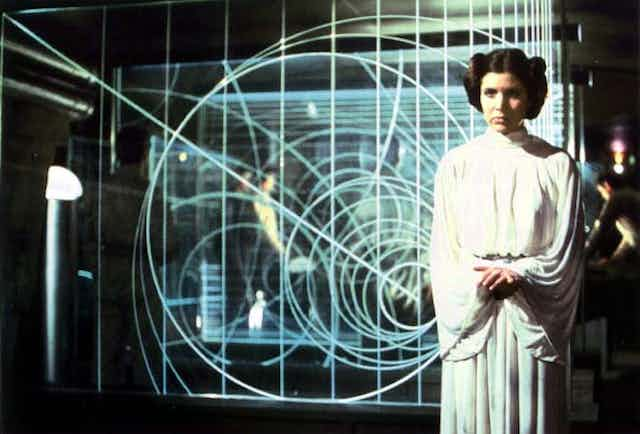When Princess Leia – older, wiser and tougher than ever – returned to the big screen two years ago in the latest Star Wars instalment, The Force Awakens, fans around the globe cheered.
Played with great wit and charisma by the late Carrie Fisher, the fictional Leia – known variously as princess, senator and general – is leader of first the Rebel Alliance, then the Resistance, fighting the monolithic forces of oppression that threaten her galaxy.
But when fans learned that Leia might have a PhD, thanks to a throwaway remark made by creator George Lucas on a 2004 DVD commentary that resurfaced when I tweeted about it recently, adoration for the Women’s March poster girl exploded online and in the press.
The Hollywood Reporter said fans were “shocked, but delighted” at the news, and Teen Vogue celebrated Leia as “a genius who somehow managed to get a PhD at age 19”. Even Mark Hamill, Fisher’s onscreen twin, Luke Skywalker, was “freaking out” about the story.
Sadly Lucas’s comment, which also appeared in Carolyn Cocca’s book on female superheroes, Superwomen: Gender, Power, and Representation, is not considered a canon in the Star Wars universe, so theories about Leia’s academic prowess and the subject of her thesis will not be addressed in any forthcoming films or novels.
That regret aside, the news sparked enormous excitement in the public imagination and raised questions about how we address women academics and how often their titles are ignored – and shows that we need more women PhDs as role models to challenge patriarchal stereotypes. Dr Organa, aka Princess Leia, is a good place to start.
My tweet intended to draw attention to the inequalities women face in higher education. Referring to the fact that women with PhDs are less likely than their male counterparts to be called doctor or professor, I suggested that Leia would have resented being called “princess” (a hereditary title) instead of “doctor” (one she had earned).
The female empire fights back
Many women will recognise the frustration, especially pertinent at the start of the academic year, when students and colleagues demote women lecturers to Miss, Ms or Mrs in emails and the classroom. A 2017 study in the US revealed that men are more likely to be introduced as “Doctor” by colleagues, and women academics on average earn 12% less than their male counterparts in British universities.
Ironically, the press response to the Leia story only emphasised the problem. While my biography on multiple websites states that I have a doctorate, I was initially presented by journalists as a “student”. The same news outlets that announced that a fictional woman character had a PhD failed to accurately report that I do, too. Indeed, one article erased both Cocca and me from the narrative, attributing the story to a male journalist instead, while another snidely cast aspersions on my qualifications.

Unfortunately, the rare examples of women with PhDs in media aimed at general audiences do little to challenge these attitudes. Dr Barbara Gordon, also known as Batgirl in Batman, is sexualised and subject to extreme physical violence. Neither Dr Maru, the mass-murderer chemist in Wonder Woman, or Dr Elsa Schneider, the evil archaeologist in Indiana Jones and the Last Crusade, are positive role models. Brainy women are bad.
And, to add insult to injury, a woman character who actually does have a PhD in the Star Wars universe, Doctor Aphra from Marvel’s Star Wars comic book series, has a fake doctorate that she obtains by bribing her supervisor.
A competent woman with a PhD, it seems, is harder to believe in than a metaphysical force that governs the universe, a weapon that harnesses a planet’s molten core, or the friendship between a man and a “walking carpet” (the big hairy co-pilot character Chewbacca for the uninitiated).
The force awakens
However, there is hope. Despite the biases against educated women evident in print and screen media, fans’ responses to the news about Leia’s PhD were overwhelmingly positive.
My Twitter notifications alone (nearly 6,500 retweets and 13,000 likes) are testament to a widespread desire to celebrate women’s academic achievements, and the need for women role models to inspire young people.
Having characters like Leia to look up to will enable boys, as well as girls, to challenge patriarchal notions about gender roles, and the possibilities for fan fiction to explore Leia’s education may encourage Star Wars fans to rethink who they identify as a doctor in future.

Beyond Star Wars, there are comics featuring women PhDs and grad students (Jill Trent in Jill Trent, Science Sleuth; Cat in My So-Called Secret Identity), and onscreen, the recent Ghostbusters reboot depicts three successful women PhDs, which might also contribute to a shift in our attitudes toward women.
Of course, simply reimagining academics as white women does not solve the problems of race, disability, or sexuality that shape our understanding of authority and cause inequalities in higher education. But as the positive response to Leia’s PhD demonstrates, there is an appetite for better and more diverse representation, and change needn’t be so far, far away, after all.

